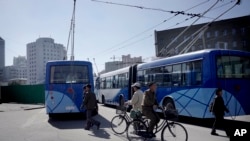North Korea has rejected a report by a United Nations human rights investigator that it is sending its citizens abroad to work under harsh conditions to earn hard currency, calling it a “reckless behavior.”
In a statement carried last week by the country’s state-controlled media Korean Central News Agency, a spokesman for the External Construction Guidance Bureau slammed Maruzuki Darusman, the U.N. special rapporteur on the situation of human rights in North Korea, for “fostering sinister acts by using the name of the U.N.”
In his latest report to the U.N. General Assembly, Darusman accused the communist country of sending tens of thousands of its citizens overseas to work under conditions that “amount to forced labor” in what appeared to be an attempt to circumvent international sanctions imposed on the country.
“DPRK nationals have been sent to work in many parts of the world, laboring under conditions that amount to a subjection to forced labor, both by their own and host governments,” Darusman told reporters last week.
Darusman estimates more than 50,000 North Koreans are working abroad to bring between $1.2 billion and $2.3 billion a year to the government from the system.
The U.N. investigator vowed to pay close attention to the issue, calling for international monitoring of the North Korean practice.
On Friday, the European Union and Japan circulated a draft U.N. resolution repeating a call for the U.N. Security Council to consider referring the North Korean human rights situation to the International Criminal Court. In December 2014, the U.N. General Assembly adopted a landmark resolution asking the U.N. council to consider the referral, but the move was opposed by China and Russia, which have veto power on the council.
The 193-member General Assembly is expected to vote on the latest resolution in December.
Jee Abbey Lee contributed to this report, which was produced in collaboration with the VOA Korean service




